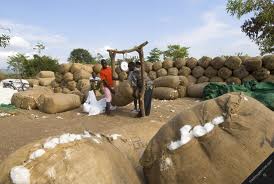M’bwanda cotton growers farmers association in Therere village , traditional authority M’gabu in Chikwawa district says that the introduction of BT Cotton in the area has proved that the variety has 100 percent improved yields from their fields where three to four tones is being produced on a one acre land.
One of the farmers who has benefited from BT cotton is Joyce Lackford.
In an interview with Face of Malawi Mrs Lackford said that before the new variety, she used to grow traditional varieties which according to her was too involving and hard to handle as large percentage of production costs was being spent on pest control.
After years of research and scientific approvals, the Malawi government joined other countries that have adopted the cultivation of genetically modified cotton seed varieties for commercial cultivation. For the past years the country started growing genetically modified – GM cotton, one of it being BT variety which is a pest resistant cotton variety, as it produces an insecticide to combat bollworm.
Farmers have been failing to gain profits from cotton farming due to lack of access to quality seeds. The coming in of genetically modified cotton seed came in as a solution.
However, access to the seed seems to be a challenge, as according to Lackson as BT cotton variety seeds are expensive.
In an interview the Cotton Council of Malawi National Chairperson Duncan Wallen said that despite this challenge but if a farmer follows instructions, chances of producing up to 3,000 bags per hectare are high.
He said it is predicted that the introduction of the biotechnology in the cotton sector, has the potential to significantly contribute to Agricultural Transformation in Malawi.
He indicated that the council aims at boosting cotton production to 200,000 metric tons and productivity to 2,000 kilograms per hectare by 2024.
On his part National Commission for Science and Technology – NCST Chief Research Services Officer Lyson Kampira said since the introduction of the new cotton variety, the yield increased to 800 kg per hectare from 400 kg per hectare.
According to Kampira this is a substantial improvement, while encouraging people to start using biotechnology to address poverty, hunger, disease and enhance Malawi’s economic growth in line with Malawi 2063.
Kampira told us that with these new varieties for example, use less insecticides while earning more profit from reduced costs and higher yields. Furthermore Kampira disclosed that apart from the biotech cotton recommended seed, at the meantime some crops like cow pea and banana are under trial just to increase the resistant in their performance through the biotechnology.




